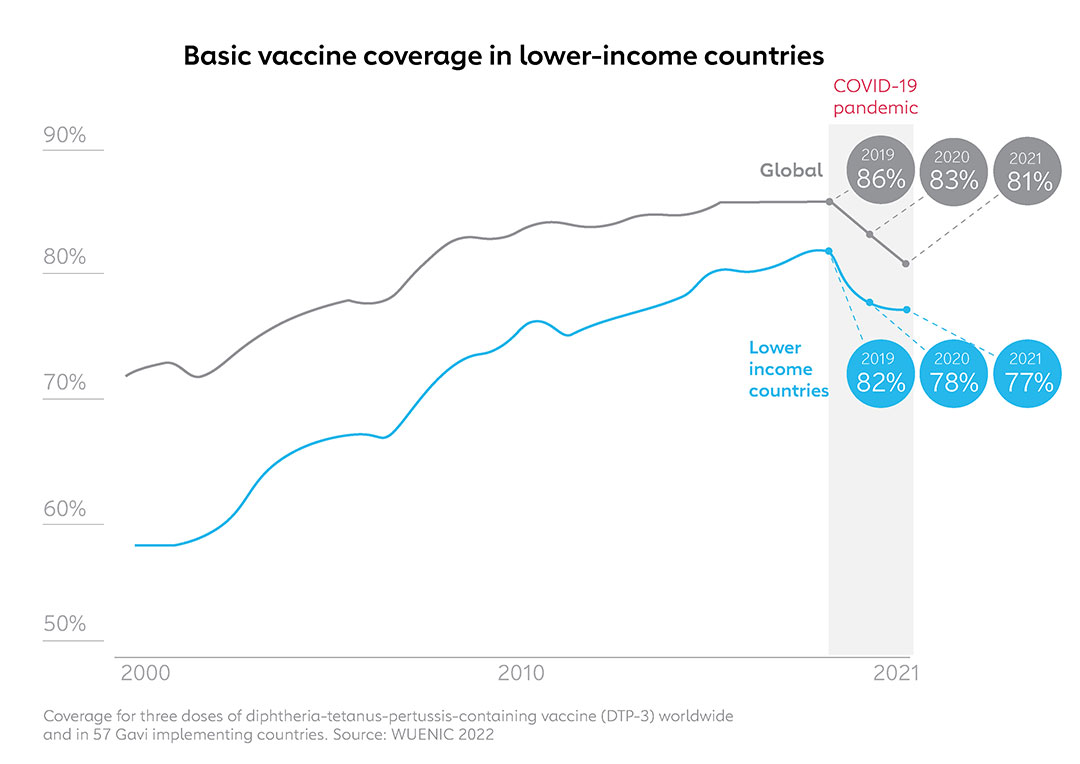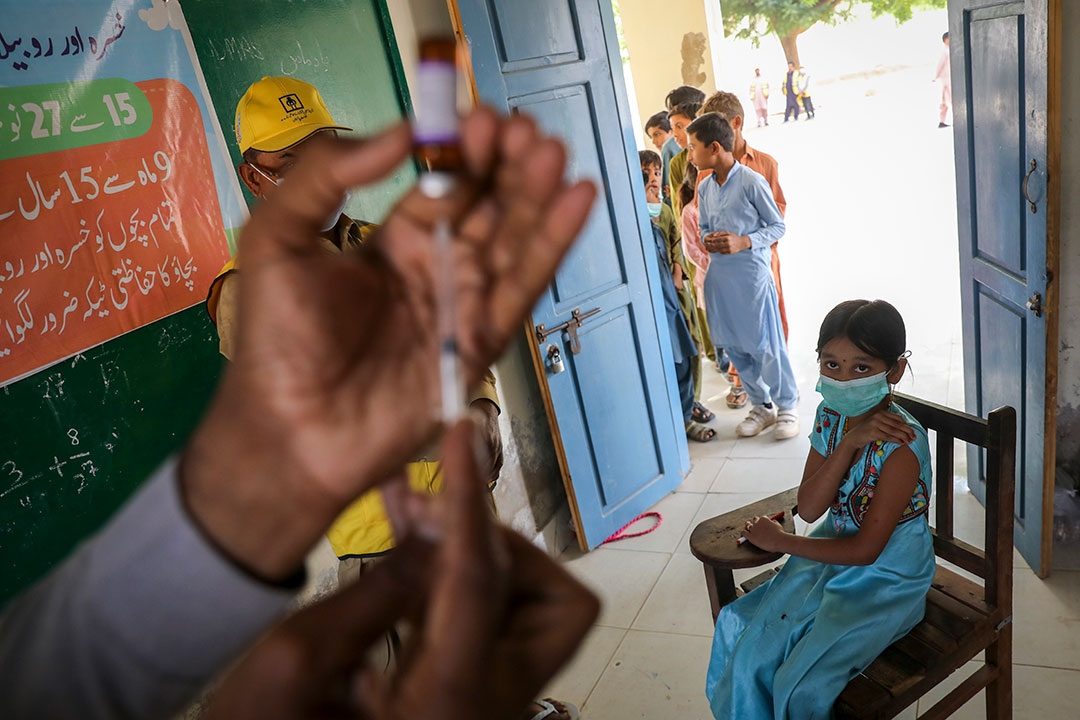-
New analysis of the state of routine immunisation in lower-income countries underlines impact of COVID-19 pandemic, but signs of recovery are emerging.
-
Basic vaccine coverage in 57 Gavi-supported countries dropped by one percentage point to 77% in 2021 following a four percentage point fall in 2020; number of zero-dose children increased by 570,000 to 12.5 million.
-
One-third of the countries analysed saw vaccine coverage increase in 2021. Two-thirds of African countries have either recovered to pre-pandemic levels or begun recovering. Chad and Pakistan stand out for strong performances.
Geneva, 29 July 2022 – An analysis of the state of routine immunisation in 57 lower-income countries supported by Gavi shows that the COVID-19 pandemic continued to hold back vaccinations in 2021, however signs of recovery are beginning to emerge.
Basic vaccine coverage1 in lower-income countries dropped by one percentage point to 77% after a four percentage-point fall in 2020, the first year of the pandemic. The number of zero-dose children, who have not received a single shot of basic vaccines, rose for the second year running to 12.5 million.
The overall decline since 2019 is primarily driven by larger countries such as the Democratic Republic of the Congo – which, after a strong growth trajectory in previous years, fell from vaccinating 73% of children in 2019 to 65% in 2021 – and India, which dropped from a high coverage level of 91% to 85%. The Democratic People’s Republic of Korea, Myanmar and Mozambique all saw large declines in coverage in 2021.
“Hiding behind these figures is a human tragedy on an enormous scale” said Dr Seth Berkley, CEO of Gavi, the Vaccine Alliance. “Millions of children have missed out on lifesaving vaccines, leaving them vulnerable to some of the world’s deadliest diseases. Gavi will continue to stand shoulder to shoulder with countries to get immunisation back on track, because no parent should have to suffer the loss of their child due to preventable illness.”
However, elsewhere there are signs of recovery emerging. One-third, or 19 of the 57 countries included in the analysis, increased vaccine coverage in 2021. Chad and Niger both increased coverage across the pandemic period from 2019-2021, reducing the number of zero-dose children by 16 and 20% respectively, while Pakistan saw strong recovery in 2021 and reduced the number of zero-dose children by more than 400,000, bringing numbers back to pre-pandemic levels.
“This analysis represents a very sobering assessment of the impact the pandemic continues to have on essential routine immunisation," said Anuradha Gupta, Deputy CEO of Gavi, the Vaccine Alliance. “It was expected in 2020 that lockdowns and other disruptions would take a toll, and in 2021, more than half of Gavi implementing countries have increased or maintained coverage – working hard to restore and recover immunisation services. However, it is clear some countries are taking longer than others. Another challenge will be the increasing birth cohort in Africa, which means immunisation programmes in this region will need to continuously accelerate to maintain and expand coverage levels. As the Vaccine Alliance, we must use these insights to provide tailored support where it is needed most: this means learning from those countries, such as Chad or Pakistan, that have demonstrated strong progress, and understanding better why other countries may be falling behind.”
The analysis, by Gavi, the Vaccine Alliance, used data from the recently published WHO/UNICEF Estimates of National Immunisation Coverage (WUENIC) to examine the state of routine immunisation in the 57 lower-income countries supported by Gavi.
Other key insights include:
- Since its inception in 2000 until the end of 2021, Gavi, the Vaccine Alliance has helped to immunise more than 981 million children with routine vaccines, helping to halve child mortality across 73 lower-income countries.
- Including COVID-19 vaccinations, lower-income countries administered more vaccines in 2021 than any year in history. In 2021, the countries that have received Gavi support administered routine vaccines to 65 million children. In addition, the 57 countries currently supported by the Vaccine Alliance administered more than two billion COVID-19 vaccines.
- Fragile and conflict-affected countries saw a lower decline in vaccine coverage than other countries, with the 12 countries classed as such by Gavi2 maintaining coverage at 67% over the course of 2021.
- Coverage for rotavirus vaccine, the second dose of measles vaccine and pneumococcal conjugate vaccine in lower-income countries have all increased since 2019, despite the pandemic.
- However, school closures and supply issues contributed to a major decline in coverage for the first dose of human papillomavirus (HPV) vaccine, which protects against cervical cancer. Globally just 12% of girls now receive this crucial vaccine.
- Demographics continue to cause challenges to routine immunisation programmes. The birth cohort in Gavi-supported countries in Africa rose by 1.2 million between 2019 and 2021, meaning immunisation programmes have to reach more children each year just to maintain coverage levels.
Following two years of unprecedented global health crisis, the Vaccine Alliance will now work with lower-income countries towards recovery – focusing on restoring coverage to pre-pandemic levels and expanding even further – with laser focus on zero-dose children. This will mean tailored strategies targeted at reaching and consistently catching up missed children, finding opportunities to integrate routine immunisation with COVID-19 vaccination and other primary health care services, and getting ahead of outbreaks by zooming in on un/under-vaccinated populations with high immunity gaps.
Alongside investments in technical assistance by a diverse range of partners, vaccine introductions and supplementary immunisation activities, Gavi will dedicate a further US$2 billion towards health systems strengthening to improve immunisation delivery between 2021 and 2025. Of this, half a billion dollars will be focused on reaching zero-dose children and missed communities – fostering new partnerships to reduce inequity, protect more lives, and build resilient health systems.

MEDIA CONTACTS
Meg Sharafudeen
+41 79 711 55 54
msharafudeen@gavi.org
Evan O’Connell
+41 79 682 18 95
eoconnell@gavi.org
Cirũ Kariũki
+41 79 913 94 41
ckariuki@gavi.org
Collins Weru Mwai
+250787836638
cmwai@gavi.org
Laura Shevlin
+ 41 79 529 92 87
lshevlin@gavi.org

